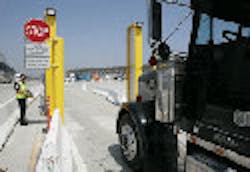The International Brotherhood of Teamsters and the Owner-Operator Independent Drivers Association (OOIDA) are but two of several groups working furiously to shut down the one-year cross-border Mexico-U.S. trucking program activated Sept. 6 by the Federal Motor Carrier Safety Administration (FMCSA). And they are pulling no punches in expressing their staunch opposition.
“The Bush administration has sucker-punched American workers by opening our highways to dangerous trucks,” said Jim Hoffa, Teamsters general president, during the group’s annual Women’s Conference in Houston, TX. “We don’t know who these drivers are and we don’t know what they’re bringing in. The weapons of mass destruction George Bush is looking for could be in the backs of these trucks.”
“This is all done in the name of global economics and cheap labor,” said Todd Spencer, OOIDA executive vp. “We believe we have a strong case against what is being called a pilot program, but is actually a stealthily implemented, pre-ordained plan to fully open our highways to Mexican trucks.”
Both groups are taking different actions to shut the U.S.-Mexican trucking pilot program down. The Teamsters have a case pending before the 9th Circuit Court of Appeals in San Francisco. But their legal briefs won’t be heard until Nov. 19 and the government’s briefs aren’t due until December 17. Meanwhile, the union is pressuring Congress to block the program via legislation.
“We know we’ve won this case in the court of public opinion, and we expect to win it in the court of law,” said Hoffa. “No one wants to share the highway with trucks from Mexico that aren't close to meeting our safety or environmental standards.”
He added that the Teamsters believe the report filed with Congress by the Dept. of Transportation’s Inspector General bolsters their argument. According to the union, the Inspector General's report notes the following legal violations:
- FMCSA has not developed plans for checking trucks and drivers at each of the 25 border crossings
- State and local officials are not able to enforce safety regulations for Mexican trucks that travel beyond the safety zone
- FMCSA didn’t meet three of 34 requirements before allowing Mexican trucks into the country, including a lack of rules on minimum requirements for longer-combination vehicles.
“We will do everything in our power to put a stake through the heart of this reckless program,” Hoffa said. “We will pursue our lawsuit all the way to the Supreme Court if necessary and we will demand that our politicians act to represent the people who elected them.”
Meanwhile, OOIDA has filed a petition with the U.S. Court of Appeals for the District of Columbia asking for a review and stay of the pilot program – contending that FMCSA “in its zeal to open all U.S. highways to Mexico-domiciled trucks” did not follow congressional directives and legal requirements.About the Author
Sean Kilcarr
Editor in Chief
Sean Kilcarr is a former longtime FleetOwner senior editor who wrote for the publication from 2000 to 2018. He served as editor-in-chief from 2017 to 2018.
